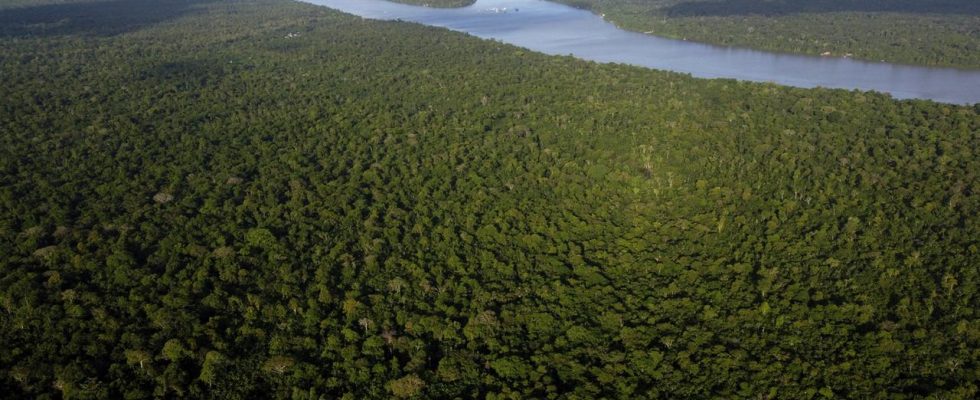At a summit meeting, the presidents of the Amazon states want to develop strategies for the sustainable use of resources. Experts disagree on how far the political will can actually go.
At the start of the Amazon summit, first positive news: According to official figures, deforestation in Brazil has fallen sharply since Lula da Silva took office – by a whole 42 percent. Zero deforestation by 2030, when the climate conference takes place in Brazil, is the President’s declared goal. He called on neighboring countries to accept this commitment.
The summit now in Belém should be a platform where the eight Amazon countries look for solutions together with the local governments and the inhabitants, so Lula. “The rainforest cannot be considered only as an ecological sanctuary. The world must take care of the right of the people of the Amazon to lead a good life,” he urged. “After all, sustainable development has three inseparable dimensions: economic, social and environmental.”
Brazil wants leadership in the fight against climate change
The project is a novelty, especially since the eight governments are by no means on the same political line. There has been a cooperation agreement between the Amazon states since the late 1970s. In addition to Brazil, these are Bolivia, Ecuador, Guiana, Colombia, Peru, Venezuela and Suriname. There hasn’t been a meeting since 2009.
The summit in Belém is another signal from the Brazilian head of state, Lula da Silva, that he is taking a leading role in the global fight against climate change – and that he is also making the industrialized countries more responsible. His Environment Minister Marina Silva made this clear again:
If the countries of Europe, the USA, but also China, the world’s largest emitter, do not reduce fossil fuel emissions, the Amazon will be destroyed in equal measure. The fact that we do not reach a tipping point is not just the responsibility of our countries. Ours is to set a good example.
Critical issue of oil production
Brazil has probably found its strongest competitor in neighboring Colombia. At the preparatory summit in the border town of Leticia a few weeks ago, President Gustavo Petro declared: “The approach of protecting forests in order to protect lives always leads to another question: How much are they paying us for it?”
This also includes the question: “Are we leaving fossil fuels in the Amazon or are we extracting them?” This is a decision that should be made jointly, even if each state is of course sovereign.
However, there is unlikely to be a common position on this, as oil production in most countries floods the state coffers with urgently needed dollars. This is also a dilemma for host Lula, which has already led to conflicts in his own coalition, which is why he has been struggling to make clear statements so far.
Prosecution of illegal activities has been difficult so far
It’s just one of many critical points. Local communities and their territories are not only under pressure in Brazil: through illegal gold mining, expanding cattle breeding and coca cultivation. In addition, the influence of organized crime is growing. Drug trafficking often goes hand in hand with the smuggling of gold, precious wood, weapons or wild animals.
Illegal funds, in turn, encourage corruption. “Illegal groups simply cross borders to avoid legal prosecution, so more international cooperation is needed,” says environmental activist Albina Ruiz, now Peru’s environment minister. That is why interior and defense ministers should also sit at the table.
domestic policy limit problems room for manoeuvre a
The states have no control over a large part of the Amazon region, Venezuelan biologist Alex Fergusson also points out. Ecuador and Peru are also stuck in serious political crises, and it is unclear who will be in the government palace in a year’s time. Meanwhile, Venezuela’s authoritarian head of state, Nicolas Maduro, is acting as if there were no environmental problems at all.
The countries that are part of the Amazon Cooperation Treaty have so many internal problems that they lack the resources, personnel and know-how to coordinate complex joint actions. They can’t even get their own crises under control, which sets the whole thing down.
Expert: Pressure from the civilian population solid
Far less pessimistic is Marcio Astrini from the environmental think tank Observatorio de Clima. It is clear that the summit is only a beginning. But the Amazon dialogues beforehand had shown that the pressure from the civilian population was massive and increasing. He also hopes that a joint council of scientists will be established.
“In the end we will have a political declaration with many declarations of intent and fewer specific points. But at least it is a signal that we want to act together,” said Astrini. “We’ll need more summits, but at least there’s a unit that didn’t exist before.”
Time is running out. Scientists warn the Amazon is nearing a tipping point as destruction continues. 17 to 20 percent have already been destroyed – with dramatic consequences for the global climate.

